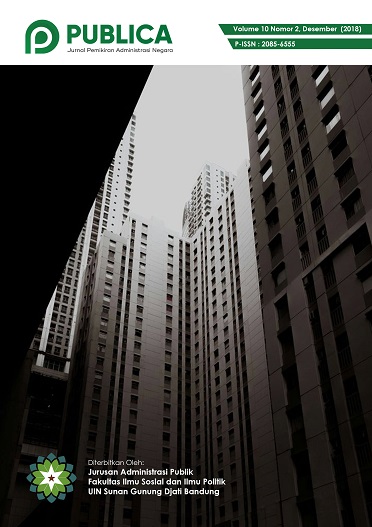Dampak Sistem Pengendalian Internal Terhadap Penagihan Piutang Di Kota Bandung
DOI:
https://doi.org/10.15575/jpan.v10i2.7626Keywords:
Internal Control System, Effectiveness and Collection of Receivables.Abstract
This research is in the background behind the problems of Bandung City, which for the past five years still have a reasonable opinion with exceptions, one of the reasons is the high level of accounts receivable at the Bandung City Financial and Asset Management Agency every year, and billing is less effective every year. receivables for leasing land and buildings in the city of Bandung. This study aims to determine the internal control system on the effectiveness of receivables collection in Bandung City BPKA and the magnitude of the influence of the dimensions of the internal control system on the effectiveness of receivables collection in Bandung City BPKA partially and simultaneously. The research used in this study is associative research with a quantitative approach because it aims to determine the effect of the internal control system on the effectiveness of accounts receivable collection at the Bandung City Financial and Asset Management Agency. Data collection uses literature studies, documentary studies and questionnaires on apparatus in Bandung City BPKA. Data analysis techniques are carried out using the correlation coefficient of determination, simple linear regression analysis and t (t-test).
References
Agoes, S. (2012). Auditing: Petunjuk Praktis Pemeriksaan Akuntan oleh Akuntan Publik.Jakarta: Salemba Empat.
Akmal. (2009). Pemeriksaan Intern (Internal Audit).Jakarta: PT Indeks.
Arrens, A.A, Randal J.E, Mark S.B. (2008). Auditing and Assurance Service: An Integrated Approach. 11 the edition. New Jersey: Prentice hall International, Inc.
Frederickson, H.G., Smith, K.B. (2003). Public Administration Theory Primer. Boulder, CO: Westview Press.
Henry, N. (2004). Public Admibnistration and Public Affairs, 9th ed. Upper Saddle River, New Jersey.
Gitosudarmo, I & Basri. (2002). Manajemen Keuangan. Edisi 4. Yogyakarta: BPFE.
Hery. (2013). 240 Konsep Penting Akuntansi & Auditing yang perlu Anda Ketahui.Yogyakarta: Gava Media.
Indriyo, A., dkk. (2002). Manajemen Keuangan. Yogyakarta : BPEE
John, M.S., Chathukulam, J. (2003). Measuring Decentralisation: The Case of Kerala (India). Public Administration and Development,. 23, 347–360.
Kausar. (2009). Revitalisasi Proses Desentralisasi dan Otonomi Daerah. Bahan Kuliah, S-3 FIA Unibraw, Malang.
Keban, Y.T. (2004). Enam Dimensi Strategis Administrasi Publik, Konsep, Teori dan Isu. Yogyakarta : Gave Media.
Marume, S. B. M. (2016). Meaning of Public Administration. Quest Journals: Journal of Research in Humanities and Social Science.
Putra, G.S. (2010). Peranan Pengendalian Intern dalam Menunjang Efektivitas Penagihan Piutang Perusahaan (Studi Kasus pada PT Putra Tama Wisata Bandung). Bandung: Universitas Widyatama.
Sulaiman, A. (2011). Keuangan Negara pada BUMN dalam Perspektif Ilmu Hukum. Bandung: Alumni.
Mahmudi. (2016). Analisis Laporan Keuangan Pemerintah Daerah. Yogyakarta : Sekolah Tinggi Ilmu Manajemen YKPN.
Sugiyono. (2014). Metode Penelitian Kuantitatif, Kualitatif, dan R&D. Bandung: Alfabeta.
Whidiyanti. (2006). Peranan Audit Internal Siklus Penggajian Kepegawaian dalam Menunjang Efektivitas Pengendalian Internal Penggajian. Bandung: Universitas Kristen Maranatha.
Wilson, J. D., John, B. C. (2002). The Commite on Auditing.(terjemahan: Tjintjin Fenix Tjahendra). Edisi Ketiga. Jakarta: Erlangga.
Downloads
Published
Issue
Section
License
Authors who publish with this journal agree to the following terms:
- Authors retain copyright and grant the journal right of first publication with the work simultaneously licensed under an Attribution-ShareAlike 4.0 International that allows others to share the work with an acknowledgment of the work's authorship and initial publication in this journal.
- Authors are able to enter into separate, additional contractual arrangements for the non-exclusive distribution of the journal's published version of the work (e.g., post it to an institutional repository or publish it in a book), with an acknowledgment of its initial publication in this journal.
- Authors are permitted and encouraged to post their work online (e.g., in institutional repositories or on their website) prior to and during the submission process, as it can lead to productive exchanges, as well as earlier and greater citation of published work (See The Effect of Open Access).
